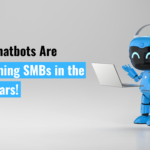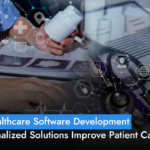Digital transformation: Building the digital future of the healthcare industry

Going virtual from physical is the major concept around which digital transformation shapes a digital future of home care and the healthcare industry.
As covid-19 swept through the major parts of the world, hindsight was the much-expected arrival of a digital revolution that is now rapidly transforming the world of healthcare. Thanks to a handful of disruptive, transformational technologies. It incorporates digital connectivity within the context of the physical world in the digital healthcare ecosystem, ensuring quick and precise medical care is the key focus of these disruptive technologies.
Due to its transformative power, it is visibly inescapable for healthcare organizations and providers to be part of major radical changes. In fact, many global healthcare providers experiencing disruptive innovations in the industry claim to entirely reinvent the medical processes over the next few years.
AI revolutionizing healthcare
The idea of automating most fundamental processes is what AI use cases revolve around. When it comes to everyday life examples, AI is implemented as a voice recognition system, personalized homepage feed, spam emails, and message filters. Siri and Alexa are well-known everyday applications. Due to its machine learning capabilities, AI goes beyond automating ordinary medical processes and offers a wide spectrum of applications where the AI software is taught to gradually learn and make independent decisions using its adaptive human-like power.
IoT wearable tech in healthcare
A report by Marketwatch extrapolates that the market value of global wearable IoT medical devices is likely to grow from $8 million in 2017 to an incredible $27 million by 2023 – a clear indicator of the rise in IoT-based wearable healthcare solutions.
To manage and address the requirements of high-risk patients, connecting digital devices via IoT apps could be an effective solution. For once, patients at larger medical risks can avail the interconnected mesh of laptops, wearable devices, mobile or tablets using IoT apps, allowing in-built sensors to measure the ongoing vital signs of the patients. The reports of medical data generated automatically from the IoT-powered digital network can be considered by healthcare providers in real-time.
Thus, wearable technology helps precisely monitor high-risk patients, accelerating the process of predicting possible serious health conditions. Amongst the most commonly worn IoT devices are pedometers, exercise trackers, heart rate measurement, and oximeters.
Robust Telemedicine services
Innovative Telemedicine applications provide a quick platform for patients to engage with doctors remotely. Telehealth services enable users to find and consult with respective physicians by connecting over voice calls or video calls. When implemented in the healthcare ecosystem, digital transformation in healthcare can facilitate on-demand access to various health services for patients. From the US to Canada and other European continents, evolutionary solutions built-in telemedicine and telehealth are rapidly quickening their pace, receiving a positive response from healthcare executives worldwide. The added feature of streaming services promotes the further growth of robust telemedicine apps.
Blockchain Technology
Popular as data encryption technology, blockchain also revolutionizes home healthcare like never before. Companies like Spaculus help extract the best blockchain solutions in inpatient data management, transactional security and data-driven medical research and analysis, and more use cases. Blockchain technology fosters intuitive mobile apps that can successfully support the operations related to medical data verifications, secure payments, breach-independent medical research, trials, etc.
Last words
With modern technologies reinventing new solutions and ways of complicated sophisticating processes, organizations and service providers experience a broad spectrum of use cases. From remote consultation with telemedicine to healthcare automation, intelligent technologies write a new digital future for the home care and healthcare industry. However, we at Spaculus software understand how challenging and overwhelming it is to keep up with the pace of digital transformation and decide which of the mentioned technologies seems like an ideal investment for you. Hence, feel free to ask us all your questions. Spaculus software will help clear the air while suggesting a viable digital transformation strategy for your healthcare business.
Tags
Categories
- API Integration (2)
- App Development (35)
- Artificial Intelligence - Spaculus Software (23)
- Blog Categories (8)
- Business Analytics (9)
- Cloud Computing (5)
- Digital Marketing (9)
- Ecommerce (3)
- IOT (7)
- Latest Updates (20)
- Live Streaming (2)
- Marketing Automation (1)
- RPA (2)
- Tech World (21)
- Uncategorized (1)
- Web Design (13)
- Web Development (22)







